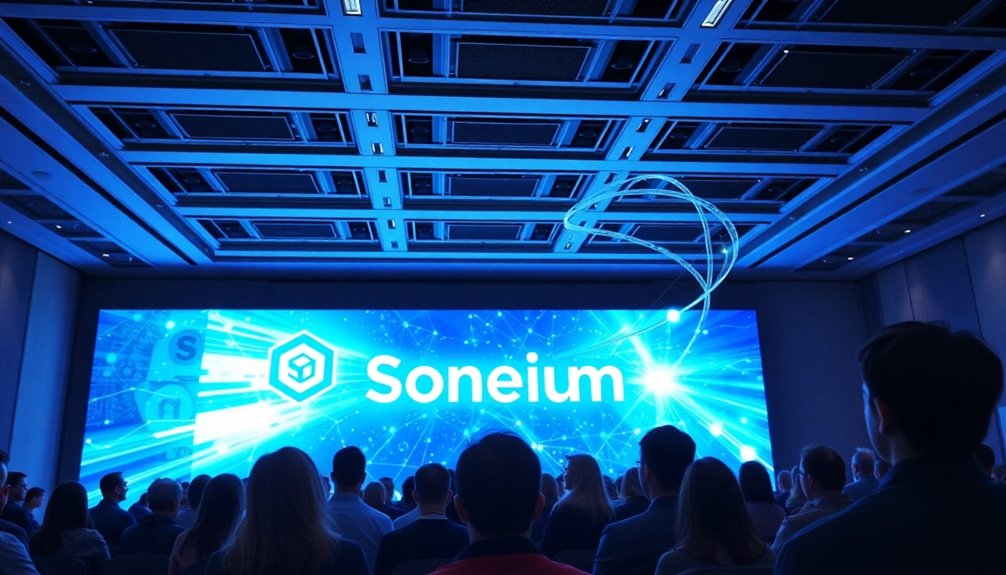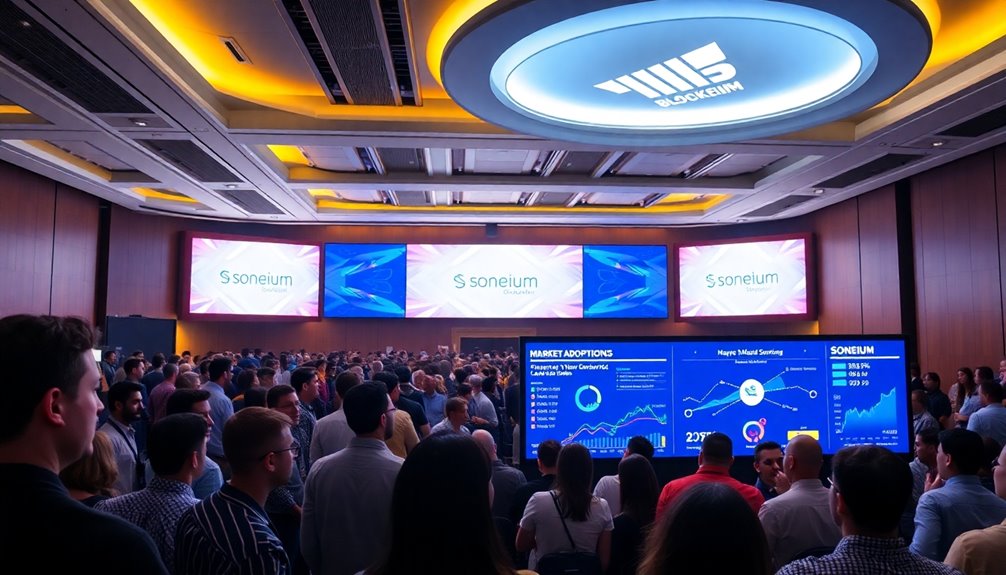Sony's Soneium Blockchain is changing the game for Layer-2 solutions. It boosts Ethereum's capabilities by processing transactions faster and at lower costs. With its public platform, Soneium encourages inclusivity and broad user participation. The multi-layer architecture optimizes smart contract execution and data storage, proving its efficiency by successfully processing 47 million transactions during testing. As the regulatory landscape evolves, Soneium stands out, offering enhanced transparency and reliability. This innovation could reshape how businesses and consumers engage with blockchain technology. Want to discover the potential impact of Soneium on industry trends and practices?
Key Takeaways
- Soneium is a Layer 2 solution built on Ethereum, enhancing transaction speed and reducing costs for users.
- The blockchain's multi-layer architecture optimizes data storage and smart contract execution efficiently.
- Soneium has processed 47 million transactions during testing, showcasing its operational effectiveness.
- It promotes inclusivity by functioning as a public blockchain, inviting broad participation from users.
- Soneium's technology aligns with current trends in consumer demand for cryptocurrency adoption and integration.
Sony's Groundbreaking Blockchain Technology

As Sony unveils its Soneium blockchain, it promises to revolutionize the way we interact with digital assets. This Layer 2 solution enhances Ethereum by offering faster transactions and lower costs. With the launch of this innovative platform, creators and developers alike will have the tools to build and scale their applications more efficiently than ever before. As the gaming and entertainment industries increasingly embrace blockchain technology, the sony layer2 blockchain soneium launches at a pivotal moment, promising to enhance user experiences and drive new revenue streams. Furthermore, Soneium aims to prioritize sustainability, ensuring that its operations align with environmental goals while maintaining high performance.
Being a public blockchain, Soneium fosters inclusivity, allowing anyone to participate. Its multi-layer architecture optimizes data storage, smart contract execution, and transaction processing. Additionally, Soneium processed 47 million transactions during its testing phase, showcasing its efficiency and appeal.
By integrating with Sony's entertainment and gaming portfolio, Soneium aims to create immersive experiences for users. This groundbreaking technology not only empowers creators through fair profit-sharing but also positions Sony as a leader in the growing Web3 market.
Dive into Soneium to discover new opportunities!
Regulatory Changes Affecting Blockchain

While the blockchain landscape continues to evolve, regulatory changes are shaping its future in significant ways.
You'll find that at the federal level, the new administration might shift from strict enforcement to collaboration, crafting clearer rules that differentiate between tokens as commodities and securities. This shift could lead to increased collaboration with industry participants in developing token regulations.
Meanwhile, states like California are ramping up enforcement, potentially leading to legal challenges.
Internationally, the European Union's MiCA regulation sets a comprehensive framework for oversight, while the OECD introduces standards for cross-border tax reporting.
Expect new tax compliance rules in 2025, like the Form 1099-DA reporting requirements.
Consumer Spending Patterns

Consumer spending patterns are shifting notably as cryptocurrency gains traction in the financial landscape. You might notice that a significant number of consumers—59%—believe financial institutions need to adopt cryptocurrency for it to gain mainstream acceptance. Many crypto owners, about 83%, show interest in crypto-linked cards, valuing the convenience of converting crypto to fiat seamlessly. Additionally, 86% are keen on earning cryptocurrency rewards. However, despite this enthusiasm, only 19% express interest in using cryptocurrency for everyday purchases. Interestingly, there's a growing demand for banks to provide crypto products, with 39% of crypto owners considering switching banks in the next year. These trends suggest a complex relationship between consumer behavior and the evolving landscape of digital finance. The recent launch of Soneium blockchain aims to enhance digital asset management, particularly focusing on NFTs and crypto integration within Sony's ecosystem. Furthermore, as investors look for tax-efficient growth options like Bitcoin IRAs, there is likely to be an increase in demand for financial products that bridge traditional finance and cryptocurrency.
Corporate Blockchain Partnerships

Companies are increasingly recognizing the value of forming partnerships with blockchain projects to enhance their operational efficiency and public trust.
By collaborating with these innovative technologies, you can boost transparency for shareholders and consumers, building credibility and brand recognition. This win-win situation not only enhances public perception but also fosters sustained trust and loyalty. Additionally, a reliable record of transactions through improved supply chain visibility via real-time tracking offers a competitive edge, distinguishing your business from competitors. As you align these partnerships with your strategic goals, you'll deliver real value to your audience.
Embracing automation via smart contracts streamlines workflows, reduces costs, and enhances trust and transparency, ultimately making your operations more efficient and user-friendly.
Election Campaigns and Blockchain Integration

As election campaigns evolve, integrating blockchain technology offers a revolutionary approach to enhancing transparency and trust in the electoral process.
You can track political donations securely on the blockchain, ensuring every contribution is transparent and traceable. This means you'll know exactly where your money goes, which reinforces compliance with campaign finance laws and reduces fraud. Additionally, the decentralized nature of the blockchain network provides a robust framework for secure and efficient transactions.
Moreover, voter authentication becomes more reliable through biometric verification and unique digital IDs, ensuring only eligible voters participate.
With immutable records, vote counting is secure and transparent. You can verify your ballot in real-time, boosting your confidence in the integrity of the voting process.
Market Adoption Trends

While the blockchain landscape evolves rapidly, market adoption trends highlight significant shifts in various sectors.
You'll notice stablecoins gaining traction, with the market hitting $200 billion in 2024 and expected to double by 2025. This growth stems from their role in financial inclusion and transaction efficiency.
Layer 2 solutions are also taking off, with transaction volumes on Ethereum's Layer 2s skyrocketing over 300% annually, thanks to lower costs and advanced rollup technologies. Notably, Soneium's launch aims to further enhance transaction speed and reduce costs in the blockchain ecosystem.
Moreover, NFTs are becoming integral to marketing strategies, with Sony's Soneium platform launching an NFT-based fan marketing initiative in 2025.
These trends not only enhance user experiences but also reshape financial landscapes, making blockchain technology a vital component of modern economies.
Frequently Asked Questions
What Are the Key Features of the Soneium Blockchain?
The key features of the Soneium blockchain include its seamless integration with Ethereum and Optimism, enhancing scalability and security.
You'll find a developer-friendly environment with advanced smart contracts and comprehensive tools at your disposal.
It encourages creativity, supporting various applications like games and NFTs.
Additionally, the infrastructure is strengthened through partnerships, offering deep liquidity and a native trading platform, ensuring you can trade efficiently with a global reach.
How Does Soneium Compare to Existing Layer-2 Solutions?
Soneium stands out among existing layer-2 solutions by offering enhanced scalability, security, and developer-friendliness.
It leverages Optimistic Rollups and Plasma Chains for efficient transactions, aiming to reduce congestion on Ethereum's mainnet.
You'll find its EVM compatibility ensures seamless integration with existing applications.
Plus, Soneium encourages community involvement, fostering a secure ecosystem.
What Industries Can Benefit From Soneium Blockchain Technology?
You'll see a range of industries tapping into blockchain technology's potential.
In entertainment, creators can engage fans with unique digital collectibles and secure ownership.
In finance, stablecoins simplify transactions and enhance security.
Supply chain management benefits from improved tracking and accountability, while gaming evolves with decentralized platforms offering true asset ownership.
Each sector can leverage blockchain's transparency, security, and efficiency to create innovative solutions and transform traditional processes for the better.
Will Soneium Support Smart Contracts and Decentralized Applications?
Yes, Soneium will support smart contracts and decentralized applications (dApps).
You'll find it offers advanced smart contract capabilities and a developer-friendly environment, making it easier for you to create and deploy your projects.
Its EVM compatibility and robust testnet ensure that your dApps can thrive.
With cross-chain interoperability and strong partnerships, Soneium aims to empower you in developing innovative solutions that can scale effectively within the blockchain ecosystem.
How Can Developers Get Started With Building on Soneium?
Imagine standing at the edge of a vast forest, where each tree represents a different opportunity.
To get started building on Soneium, you'll want to dive into its comprehensive documentation, guiding you like a trusted map.
Set up your environment on the Soneium Minato testnet, where you can experiment without fear.
Engage with the community for support, and let your creativity flourish as you develop innovative dApps that can thrive in this vibrant ecosystem.
Conclusion
In conclusion, Sony's Soneium blockchain is set to change the game for layer-2 solutions, much like how the internet transformed communication. As regulatory landscapes evolve and consumer spending shifts, businesses are bound to jump on board this innovative tech. With corporate partnerships and election campaigns embracing blockchain, it's clear the future's looking bright. So, get ready to ride the blockchain wave—it's not just a fad, it's the next digital revolution!









